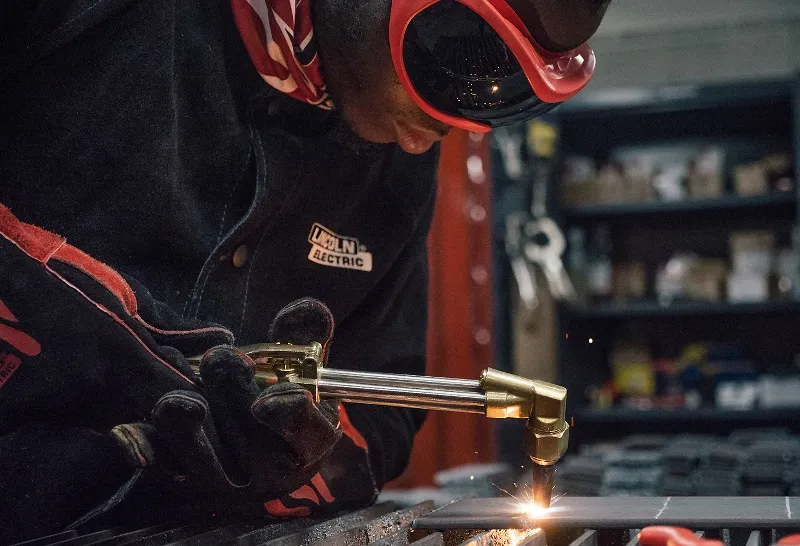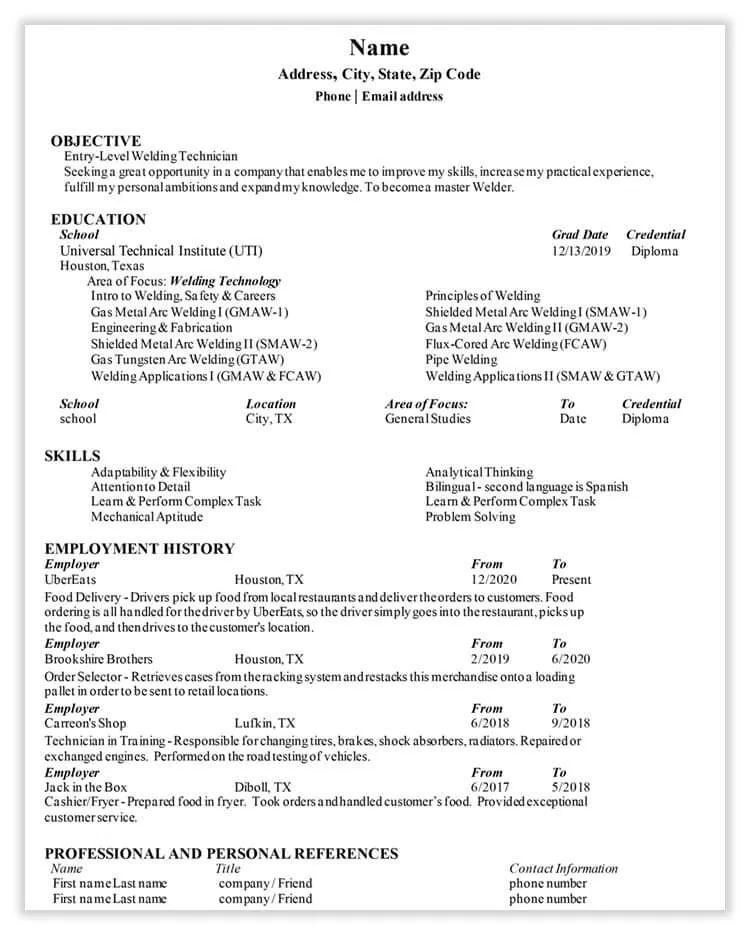Average Welder Salaries by Industry, Location & Experience
Discover average welding pay, pipeline welder salary, rig welder salary, highest paying welding jobs and more. Find out how much welders make.
Your resume is a crucial document when applying for a welding position, as it provides a summary of your education and experience. It is important to put together your resume in a way that highlights your potential and makes a good first impression.
Elements to include in your welding resume are a summary or objective, work experience, education, relevant skills and awards or accomplishments. The appearance of your resume is important, so choose a simple design with neutral colors and a legible font. Along with your resume, it is recommended to write a tailored cover letter that highlights why you are qualified and interested in the position.
Whether you’re creating a resume from scratch or working to update a previous one, having a guide to follow can help ensure you include all the necessary information. Continue reading to find out what to include in your resume, how to format it and more.
Your resume is the first thing an employer sees before they meet you, so it’s important that you put it together in a way that highlights your potential and makes a good first impression.
Before writing your resume, you need to have all relevant information handy! Here’s a list of info you may want to gather before you dive in:
Every resume has common elements to include that can show an employer why you are a right fit for the job.
Important elements include:
A resume is a document that can be altered and changed over time, depending on the type of experience and achievements you gather. Updating your resume and improving it often is something you should be sure to do. It’s also important that you edit your resume depending on what job you’re applying for. That way you can ensure that the skills and experience align with the position as best as possible.
The job market is competitive, especially when it comes to the skilled trades. In fact, total welder employment is expected to exceed 463,000 by 2033.50 For a resume to catch an employer’s eye, it needs the right combination of relevant content and a professional, streamlined layout.
All resumes are unique to some extent, based on the skills and experience they reflect. That said, there are some basic elements that all resumes should cover.
Depending on your background, you should include either an objective or a summary at the top of your resume.
A resume summary should be used if you have previous welding experience in the workforce. It will outline your past welding jobs and skills, including accomplishments that can highlight why you’re a great choice for the job.
An example summary might say something like, “Experienced MIG welder with 2+ years of experience working for Lincoln Electric. Seeking to use management and leadership skills to manage employees and large-scale welding projects.”
A resume objective is the choice you should go with if you have little to no experience in the workforce. This will express who you are and what your career goals are.
An example objective might say something like, “Universal Technical Institute graduate seeking full-time employment with Lincoln Electric. Looking to secure an entry-level position as a welder that will allow me to use the skills I acquired to pursue a career in the industry.”
Whether you include a summary or objective, be sure to provide enough information to interest the employer without going overboard. Short and sweet is best!
This section of your resume is where you outline previous positions or jobs you’ve held. Outlining past work experience can help show how you’d be beneficial to a new welding role. With each position you list, be sure and include:
Always list your job experience in chronological order, starting with your most recent position. For this section, just like with your summary/objective, be sure to include relevant information without making it too lengthy. If you’re a recent graduate, you might be thinking, “I’m not sure what to include — I don’t have a lot of working experience!” Don’t fret. You can list personal projects you’ve worked on, as well as volunteer or academic projects in this section. Be sure to list specifics of what these projects entailed and how they’re relevant to the career you’re pursuing in the welding industry.
One key section that employers have their eyes open for is education. This is where you list what school or schools you’ve attended, your graduation year, programs completed and GPA.
This section also gives you the opportunity to list additional certifications you might have. If you’ve taken and passed any tests with the American Welding Society, for example, this would be a great place to highlight those and help set yourself apart from other candidates.
This is also a section you can expand upon if you find that your experience section is short or if you’re a recent graduate. As a UTI welding graduate, for example, you could list individual courses you took that are relevant to the position.1 This might look like:
Universal Technical Institute (UTI) Bloomfield, New Jersey
Welding Technology
Depending on the job you’re applying for, the skills section on your resume can be tailored to fit it. It’s important to pay close attention to the job description of the position you’re applying for before writing out your relevant skills.
Skills include your abilities to do something thanks to training and experience. Welding skills for a resume may include things like math and science (including working with formulas), problem-solving and quality control. If you have some work experience and are applying for a higher position, such as a welding inspector, a mention of your leadership skills would fit well.
Any awards or accomplishments that could benefit you in the role can be listed in a separate section on your resume. These things could be anything from being voted “Employee of the Month” to having a high GPA or perfect attendance.

Be sure to include your contact information somewhere on your resume. An employer will need this information if they decide to reach out to you, so be sure and include the following:
The appearance of your resume is something you’ll want to be sure and pay attention to. You will want to present the information in a way that is visually appealing and easy to read. A range of free templates exists, allowing you to simply input your information.
Microsoft Word offers several free resume templates, as well as options from websites like:
Choosing a simple resume design with neutral colors and a legible font is the best way to go. It’s also best to keep your resume to one page, if possible. Employers are likely to be drawn to resumes that are concise and to the point. Looking at examples of resumes can be helpful when you’re composing your own. You can find plenty of welder resume examples online with a quick Google search, but here’s a link to an example of a welding resume to get you started: https://resumegenius.com/resume-samples/welder-resume-example

Along with your resume, you should write and include a cover letter when you apply for a position. Cover letters are one-page messages that help provide information about the role you’re applying for, why you’re qualified and why you’re interested in working for the company. A cover letter is important because it helps tell your story and give the employer more information about you before an interview. It also helps you build a relationship with the employer and highlight your personality.
When writing a cover letter, you should be sure and tailor it to the specific job you’re interested in. While you can work off a template, customizing the letter to highlight why you’d be a good fit for a position is important every time.
A cover letter for a welding position might look something like this:
https://resumegenius.com/cover-letter-examples/welder-cover-letter
Remember at the end of the day that your resume and cover letter can be a great way to make a first impression and attract the attention of an employer. Putting them together and perfecting them can help give you confidence when interviewing for roles you’re passionate about.
Universal Technical Institute of Illinois, Inc. is approved by the Division of Private Business and Vocational Schools of the Illinois Board of Higher Education.